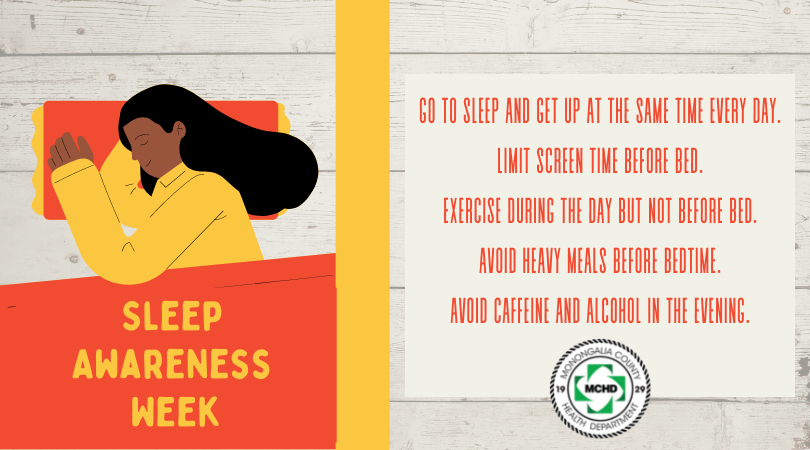Follow these tips to help you get more zzzzzz's

Mar. 16, 2022
By Mary Wade Burnside
It’s not a coincidence that Sleep Awareness Week started on Sunday, the same day as when we spring forward an hour for Daylight Savings Time and lose an hour of zzzz’s.
As a longtime night owl, I long ago began changing the time on my clocks early in the evening so I didn’t literally lose track of time and settle into bed at what I thought was a decent time, only to have to adjust my thinking and my alarm.
Lately, I realize I need to adjust my thinking even more and not just set a bedtime for myself, but a time even earlier than that to begin winding down.
According to the Centers for Disease Control and Prevention, adults need seven or more hours of sleep per night. One in three adults do not get enough sleep, and apparently, this is another list on which West Virginia falls on the wrong end. In 2014, between 38-44 percent of West Virginia adults reported consistently getting less than seven hours of sleep in a 24-hour period, which put us in the highest percentile along with Kentucky, Ohio, Maryland and other states.
And not getting enough sleep can help lead to a variety of medical conditions, including diabetes, heart disease, obesity and depression. That’s one reason why this topic is an important one to Monongalia County Health Department. Well-rested people are healthier, and that’s always important, especially during the COVID pandemic.
So, let’s go over the tips on how to try and improve that statistic. First, develop a relaxing bedtime routine. The calmer and more relaxed you are when you slip between the sheets, the better.
It’s best if you go to bed at night and wake up in the morning at the same times every day, including weekends. That can be a challenge for people who want to sleep in after a long work week.
If you don’t fall asleep in 20 minutes, get up. Lying in bed awake can be frustrating, and checking the clock frequently does not help.
Next, the calmer the bedroom is, the better. Bedrooms should be quiet and dark and kept at an optimal temperature. It’s better for the room to be on the cool side. Since my husband installed a smart thermostat, we have it set to lower to 68 degrees Fahrenheit at bedtime and to start warming up just before we rise.
Removing electronic devices from the bedroom is definitely a tough one these days. But those devices can be stimulating, which is the opposite of how you want your brain to be as you try to unwind from your day. It is recommended to avoid screens for at least 30 minutes before going to bed. And doom scrollers — you know who are — should take measures to quit endlessly surfing social media.
Also, avoid eating large meals and drinking caffeinated beverages or alcohol too close to bedtime. When your belly is busy digesting, you are not going to get your best sleep. And even though alcohol might initially relax you, it can wake you up in the middle of the night too.
Finally, while you don’t want to exercise a lot just before bed, getting plenty of activity during the day will help you feel tired at night.
If you follow at least most of this advice and still have trouble sleeping, you may want to talk to your doctor. Sleep is fundamental to our health and well-being, so figuring out how to have a good night will go a long way to making you feel good.
Mary Wade Burnside is the public information officer at Monongalia County Health Department.